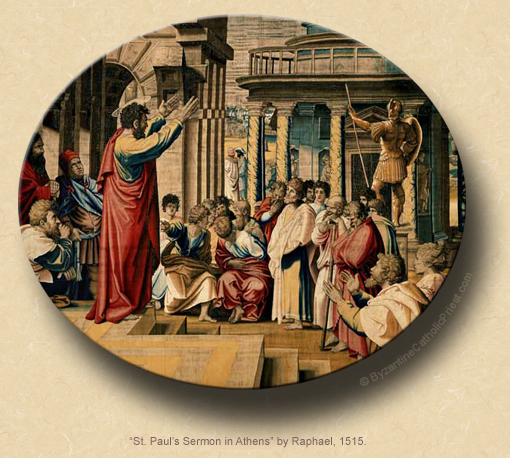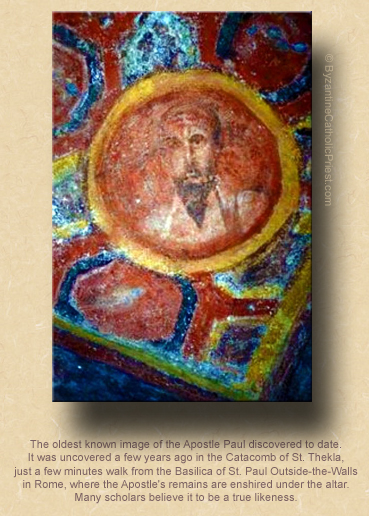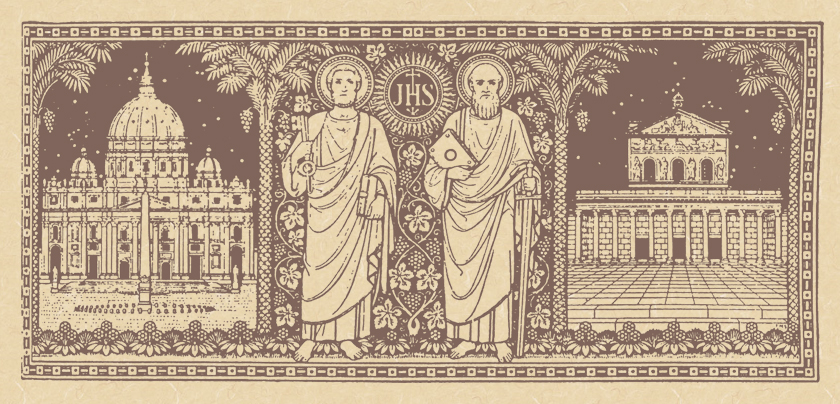Father Michael's Second Rule for the Interior Life: Never Expect to See the Results of Your Efforts.
The Twenty-First Friday of Ordinary Time.
Lessons from the secondary feria, according to the ordinary form of the Roman Rite:
• I Corinthians 1: 17-25.
• Psalm 33: 1-2, 4-5, 10-11.
• Matthew 25: 1-13.
The Fourteenth Friday after Pentecost; and, the Commemoration of Saint Zephyrinus, Pope & Martyr.*
Lessons from the dominica,** according to the extraordinary form of the Roman Rite:
• Galatians 5: 16-24.
• Psalm 117: 8-9.
• Matthew 6: 24-33.
|
If a Mass for the commenoration is taken, lessons from the common "Si díligis me…" for One or Several Popes:
• I Peter 5: 1-4, 10-11.
• Psalm 106: 32, 31.
• Matthew 16: 13-19.
|
The Fourteenth Friday after Pentecost; the Feast of the Holy Martyrs Adrian & Natalia; and, the Feast of Our Blessed Mother Mariam Bawadi.***
Lessons from the pentecostarion, according to the Ruthenian recension of the Byzantine Rite:
• I Corinthians 4: 4: 8-21.
• Mark 6: 45-53.
FatherVenditti.com
|
 8:42 AM 8/26/2016 — The last time I preached to you we observed the Blessed Apostle Paul throwing some cold water on an argument that had arisen in Thessalonica about the Second Coming of Christ, telling the Thessalonians that they'd do better to simply live the faith the way he taught them to and not bother nitpicking about apocalyptic details that have nothing to do with how they're supposed to be living their lives anyway: when Christ comes again is his affair, not ours; and, as long as we're in the State of Grace, what difference does it make? But in every community there are always nitpickers whose low self-esteem compels them to agitate at every opportunity, getting everyone ginned up about things that no one can do anything about anyway. So, I reviewed Father Michael's Number One Rule for the Interior Life: mind your own business. Yesterday, we heard the beginning of Paul’s First Letter to the Corinthians, so we can pick up from there. 8:42 AM 8/26/2016 — The last time I preached to you we observed the Blessed Apostle Paul throwing some cold water on an argument that had arisen in Thessalonica about the Second Coming of Christ, telling the Thessalonians that they'd do better to simply live the faith the way he taught them to and not bother nitpicking about apocalyptic details that have nothing to do with how they're supposed to be living their lives anyway: when Christ comes again is his affair, not ours; and, as long as we're in the State of Grace, what difference does it make? But in every community there are always nitpickers whose low self-esteem compels them to agitate at every opportunity, getting everyone ginned up about things that no one can do anything about anyway. So, I reviewed Father Michael's Number One Rule for the Interior Life: mind your own business. Yesterday, we heard the beginning of Paul’s First Letter to the Corinthians, so we can pick up from there.
Just to review, Paul had dropped off his friend Timothy in Ephesus to be the new bishop there, then continued on into Macedonia where he receives a vision from the Lord asking him to take the Gospel into Greece. He goes to Philippi, to Thessalonica, to Athens; he basically fails in all of these places except for a few converts here and there, and later writes letters to them which are preserved for us in the New Testament, with the exception of Athens, with his activities there being recorded by Saint Luke in the Acts of the Apostles. So, he's all depressed and dejected about this when he first sets his eyes on the great city of Corinth; and, I had mentioned that what happened there would be a story for another day; today, then, is another day.
Corinth is a very old city, founded as early as the nineteenth century before Christ. In the days of Socrates it was known as the Doric city, filled with museums and works of art; that is until the Romans stumbled upon it and decided that it just wasn't Roman enough to suit them, so they set about to improve the décor in the only way they knew how: by burning it to the ground. A century later, around 44 BC, it was rebuilt by Julius Caesar as a military outpost, and he colonized it with Italians. Over the next one hundred years, it grew again to become the leading commercial and political center of Greece, and this is around the time that the Blessed Apostle first sets foot in it.
Now, to understand Paul's activities in Corinth, we have to understand something of what this city had become. Athens, of course, was the capitol of Greece, as you know, and it never did cease to be the intellectual and cultural center of that country, but its political influence was waning in the face of Roman expansion; so, that role began to be assumed more and more by Corinth.  And while the old Doric city that Socrates would have known was probably one of the most beautiful in the world, the new Corinth was a cesspool by comparison. It had all the political and commercial influence of the old Athens, but none of the culture. It was Athens without the statues and the poetry; kind of like Washington, DC, with all the politics but none of the monuments. You've heard the expression, “A nice place to visit, but I wouldn't want to live there”? Well, Corinth wasn't even a nice place to visit. Nobody wanted to go to Corinth; you went there because it was the biggest seaport in the world; and, if you were involved in any kind of trade at all, and wanted a piece of the action, you had to be there. Its debauchery had even become part of the popular lexicon: the phrase “to live like a Corinthian” was slang for someone who lived an immoral life, and prostitutes were often referred to as “Corinthian girls.” And while the old Doric city that Socrates would have known was probably one of the most beautiful in the world, the new Corinth was a cesspool by comparison. It had all the political and commercial influence of the old Athens, but none of the culture. It was Athens without the statues and the poetry; kind of like Washington, DC, with all the politics but none of the monuments. You've heard the expression, “A nice place to visit, but I wouldn't want to live there”? Well, Corinth wasn't even a nice place to visit. Nobody wanted to go to Corinth; you went there because it was the biggest seaport in the world; and, if you were involved in any kind of trade at all, and wanted a piece of the action, you had to be there. Its debauchery had even become part of the popular lexicon: the phrase “to live like a Corinthian” was slang for someone who lived an immoral life, and prostitutes were often referred to as “Corinthian girls.”
When Paul enters Corinth, with all of its debauchery and corruption and immorality, he has little reason to suppose that he will have any more success than he had anywhere else along the way;—in Philippi, in Thessalonica, in Berœa (which was another place he was chased out of), and particularly in Athens—and yet, by time he leaves there in the summer or fall of the year 52, it is the largest, most flourishing, and most active of all the Churches he established, even to the point of sending out missionaries of its own to spread the Gospel throughout cities all over Greece. We can't estimate how many Christians Paul left behind in Corinth, but we do know that they were from every nationality on the map, and some of them he mentions by name: Tertius was a Roman; Erastus was a Greek; Crispus was Jew. Most of them were from the lower classes, but there were some wealthy merchants as well; and, all of them, so Paul himself testifies, were fervent, eager, and richly blessed with the gifts of the Holy Spirit.
I remember having a conversation with a younger priest who was discouraged about what he perceived to be his failure to reach the souls of the people of his parish, and I had a hard time getting through to him because it's the kind of lesson you learn only after years of experience, which he didn't have: you leave a parish behind after being replaced by someone else, thinking that you've been a failure, only to learn years later that the seeds of Grace you planted there have borne fruit; you just weren't there to see it. And it's just as true for all of us: we may think that we've failed to reach our child who can't stay out of trouble, or that relative who won't talk to us, or the friend or neighbor that we crossed the wrong way, or anyone that we've tried to bring back to some semblance of Christian living. We may not see the change take place, but that doesn't mean what we tried to do was worthless. The other day I reviewed for you Father Michael's Number One Rule for the Interior Life; today we revisit the Number Two Rule: never expect to see the results of your efforts.
One of the frustrations we face in our quest to follow our Lord is the sense that we all have at times, that we're not making any progress. We suffer the same struggles over and over again, we confess the same sins time and again, and we think that nothing we can do will change it. But we are not the ones to judge that. No effort we make to reproduce the Gospel, either in ourselves or in others, is ever wasted. Every effort, every struggle, brings Grace. We're not exactly objective when viewing ourselves, so we don't see it. In this sense, we could say that Saint Paul needed to heed the advice he had given to Timothy: to stop looking into himself and instead trust our Lord to do the work.
As we hear these lessons from First Corinthians, we might find it advantageous to add an item to our examination of conscience: after listing all the sins we need to address, we might consider to what extent we're willing to let God handle them for us. Remember how the Prodigal Son had a whole speech rehearsed for his father about how it was all his fault, but his father never let him finish the speech because he had already forgiven him.
I'll leave you, then, with a thought about this by that great Father of the Church, Saint Ignatius of Antioch. Reflecting on Saint Paul's experiences, he said:
The Lord overlooks nothing. Even secrets are open to Him. Let us then do everything as if He were dwelling in us. Thus we shall be His temples, and He will be within us as our God—as He actually is (On the Letter to the Ephesians).

* The holy successor of St. Victor governed the Holy See for eighteen years, suffering martyrdom under Antonine in AD 217.
** In the extraordinary form, on the ferial days outside of privileged seasons, the lessons are repeated from the previous Sunday.
*** Adrian and his wife, Natalia, suffered martyrdom under Emperor Maximian. Mariam (or Miriam) Bawadi is one of two Palestinian religious sisters canonized by Pope Francis.
|

